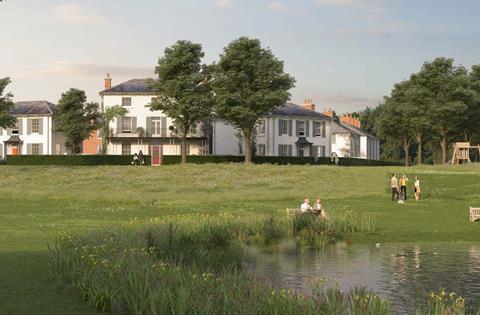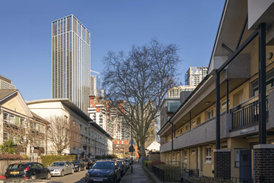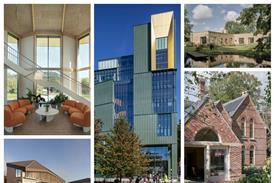Traditionalist urban designer highlights quality concerns regarding Labour’s plans to address the UK’s ongoing housing crisis

In a wide-ranging interview with The Sunday Telegraph, traditionalist architectural designer and urbanist Ben Pentreath, has expressed both optimism and serious concerns about the Labour government’s ambitious target to build 1.5 million new homes in five years.
Pentreath, known for his contributions to a string of Duchy of Cornwall developments, including Poundbury in Dorset and South East Faversham in Kent, acknowledged the critical need for new housing but questioned whether the current approach is capable of delivering high-quality homes at such a rapid pace. Reflecting on the planned mass expansion in housing, he said, “If the aim is to build 1.5 million houses in the next five years, which is an awful lot of houses every single day, inevitably you are going to be working with those large volume housebuilders… And you better just eat it up. You can’t worry about it.”
Much of Pentreath’s concern stems from the nature of the UK’s modern housebuilding industry, which is dominated by a few large developers. “The vast majority of houses in the UK are built by a clutch of housing developers. They are shareholder driven, so their job is to build as many houses as quickly and cheaply as possible, and actually, they’re quite good at it,” he remarked, acknowledging the efficiency of these developers but questioning the long-term value of what they produce. “Most aren’t nice, they’re not well-designed. But it’s normal. It’s not weird.”
One of the most contentious elements of Labour’s housebuilding agenda is the potential development of green belt land, traditionally protected areas of countryside around cities. While Pentreath isn’t entirely opposed to green belt development, he stressed that it must be done with care and respect for both the environment and heritage. “There are armies of terraced houses marching over the countryside, with haystacks and animals running away,” he said, invoking a satirical 18th-century image to describe his fears of unchecked urban sprawl.
Despite his concerns, Pentreath emphasised that history shows large-scale expansion can work if it is handled with vision and attention to detail. He cited examples like Edinburgh’s New Town, Liverpool, Bath, and Cheltenham, which grew rapidly during the 18th and 19th centuries and are now seen as beautiful and desirable places to live. “The population [of Liverpool] went up from something like 20,000 people in the 1780s to a million people by the year 1900. And I won’t say it’s all perfect, but that’s an astonishing expansion,” he noted.

However, Pentreath warned that the UK has lost its confidence in building at scale. “We have completely lost our sense of self-belief. It’s astonishing,” he said, comparing today’s crisis of confidence with the boldness that characterised earlier periods of expansion. He argued that modern developments often lack the same level of care and creativity seen in past centuries.
In the interview, Pentreath reflected on the challenge of balancing heritage with the need for new development. He called for a more nuanced approach, one that is willing to embrace the future while respecting the past. “I definitely define myself as a traditional architect or designer, because I’m deeply interested in old buildings and I’m definitely not afraid of copying them. I think originality is extremely overrated,” he said, explaining his belief that new developments should draw from history while maintaining an openness to modern ideas. “There’s this whole arcadia narrative of how life was better in history which I totally don’t subscribe to.”
Pentreath also highlighted the public’s growing demand for well-designed homes. While there is increasing acceptance of new housing developments, he noted that people “want them to be beautiful, sustainable, and have proper services and infrastructure. Surely not too much to ask – but one wonders if it will be delivered.”
Drawing on his own experiences working on projects like Poundbury, Pentreath stressed the importance of long-term thinking in housing developments. He warned that the current five-year target may compromise the ability to craft well-designed, community-focused developments. “We’d have to build Poundbury every two days for the next five years,” he quipped, underscoring the scale of the challenge ahead. Poundbury, a development 30 years in the making, has been praised and criticised in equal measure, but its slow pace contrasts sharply with the government’s ambitious target.
Pentreath acknowledged that more homes are desperately needed, particularly as younger generations struggle to find affordable housing. “For better or worse, we do need the houses,” he said, but he cautioned against sacrificing quality for the sake of speed. He remains hopeful that the UK can rediscover its confidence in building well-designed homes that stand the test of time, but he warned that without careful planning and execution, the country could face regrets in the decades to come. “Let’s hope we won’t regret it in 30 years. It will be partly good and partly bad.”
>> Also read: ‘We wouldn’t be doing it if it wasn’t wanted’: Duchy of Cornwall project team defends 2,500-home Faversham scheme
















No comments yet